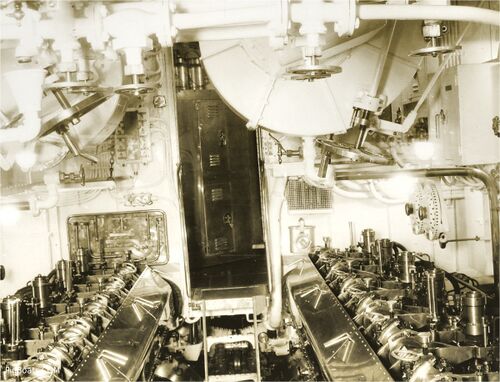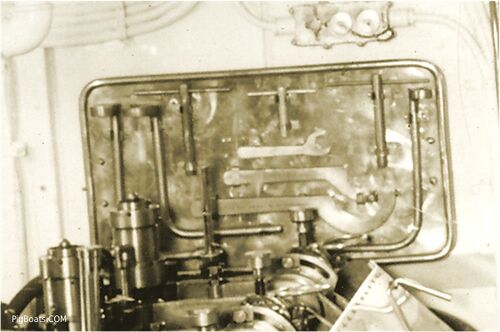Dolphin Generator Room: Difference between revisions
Pbcjohnston (talk | contribs) Added photos |
Pbcjohnston (talk | contribs) Added more photos |
||
| Line 113: | Line 113: | ||
[[File:Red bar sub new 2.jpg]] | [[File:Red bar sub new 2.jpg]] | ||
[[File:Dolphin GenRm-4b.jpg|left|500px]] | |||
<div style="text-align: justify;"><span style="color:#00008B">A close up of the engine order telegraph. This was used by the watchstanders in the maneuvering room to sends commands for the generators to the operators in the generator room. The electrical load was regulated from maneuvering, and if more or less power was needed this telegraph was used to send those commands. | |||
<small>US Navy Photo Contributed by Roger Torgeson</small> | |||
[[File:Red bar sub new 2.jpg]] | |||
[[File:Dolphin GenRm-2.jpg|left|500px]] | |||
<div style="text-align: justify;"><span style="color:#00008B">In this view the photographer is at the aft end of the generator room looking forward. The open door to the Chief's Mess can be seen. The short ladder shows how you had to step up into the mezzanine level. The diesel engines are in the foreground, and the electrical generators themselves are under the mezzanine level. The large white tanks in the overhead are gravity feed fuel oil tanks for the diesels. | |||
<small>US Navy Photo Contributed by Roger Torgeson</small> | |||
[[File:Red bar sub new 2.jpg]] | |||
[[File:Dolphin GenRm-2b.jpg|left|500px]] | |||
<div style="text-align: justify;"><span style="color:#00008B">A close up of the photo above, showing details of the mezzanine level. The sheet metal doors to the food storage area can be seen. The Chief's Mess would be to the right inside this space. | |||
<small>US Navy Photo Contributed by Roger Torgeson</small> | |||
[[File:Red bar sub new 2.jpg]] | |||
[[File:Dolphin GenRm-2c.jpg|left|500px]] | |||
<div style="text-align: justify;"><span style="color:#00008B">A specialized tool kit for the crewmen in the generator room. | |||
<small>US Navy Photo Contributed by Roger Torgeson</small> | |||
[[File:Red bar sub new 2.jpg]] | |||
<center> | <center> | ||
Page created by:<br> | Page created by:<br> | ||
Revision as of 12:59, 19 June 2023
Galley

After WW II the submarine service went to a "open galley" policy and food was available anytime a crewman wanted it. The rule became that you could cook it but you had to clean everything up afterwards. You were treated as a mature adult and you were expected to act as one.
This is the only food preparation space on the boat; it served both the enlisted and the officers. It was small, compact, and efficiently laid out. A submarine galley produced the best quality food in the fleet.
US Navy Photo Contributed by Roger Torgeson
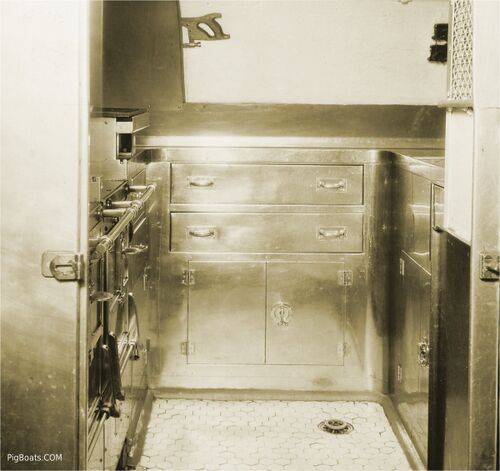
There is a drain in the forward port corner of the tiled deck to aid in washing and cleaning the galley, which was probably done after each meal preparation, so that would be up four times a day at sea.
There is a sink in the counter top to the right. This was used to wash cooking pots and pans. General dish washing was done in the scullery across the passageway.
US Navy Photo Contributed by Roger Torgeson
Store Room
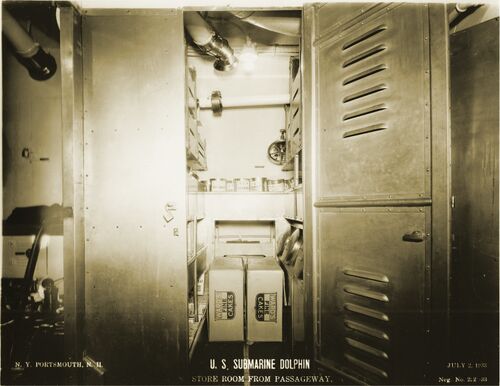
US Navy Photo Contributed by Roger Torgeson
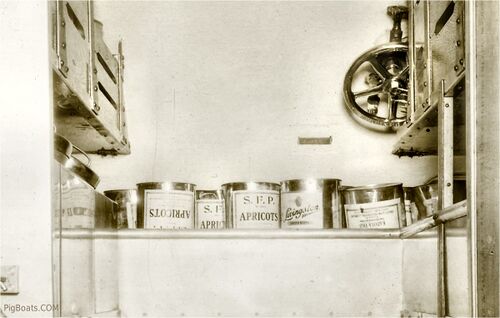
We've tried to identify the brands. The apricots are from a brand called S.F.P. We haven't been able to find anything on this brand yet. There is one can is noted as being "Livingston - Garden Beets", again the brand is still illusive. The up-side-down can is Kadota Figs from the Pratt-Low Preserving Company of Santa Clara, California. Pratt-Low was noted for having a large production of canned Apricots. Since the fig can is up-side-down we are unable to determine if the brand might be the S.F.P. as well. Kadota is a region of California near Merced, California.
At left are the lids to two bulk food bins. What was stored in them is unknown but possibly sugar, flour and maybe beans or coffee.
The valve handle in the upper right says "Emergency Vent Port". If there are any words before the word emergency they have been blocked.
US Navy Photo Contributed by Roger Torgeson
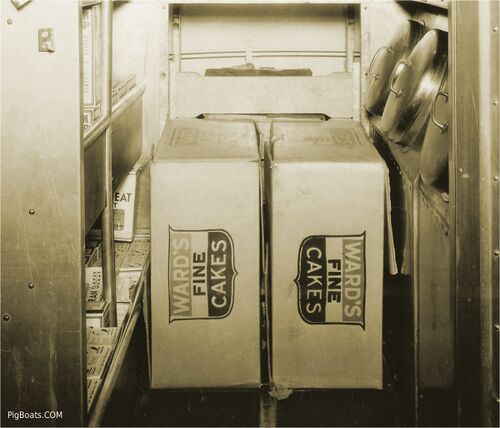
All sorts of dry foods are on the shelves to the left. At least says "Bran Flakes" on it. To the right are three large bins with lids that held bulk foods, most likely flour and sugar.
US Navy Photo Contributed by Roger Torgeson
Chief's Mess and Scullery

US Navy Photo Contributed by Roger Torgeson
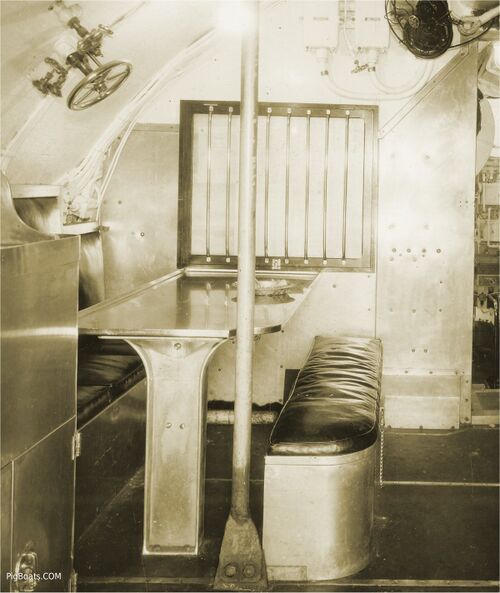
The frame with the bars is actually a bulletin board with a glass front and various Navy messages and directives are posted in it. The bars are to prevent someone falling into the glass in rough weather.
The fan in the upper right is running. The blades are a blur. It is hot inside the submarine as there is no air conditioning for submarines yet. It is July the 4th and it is summer in the Northeast.
US Navy Photo Contributed by Roger Torgeson
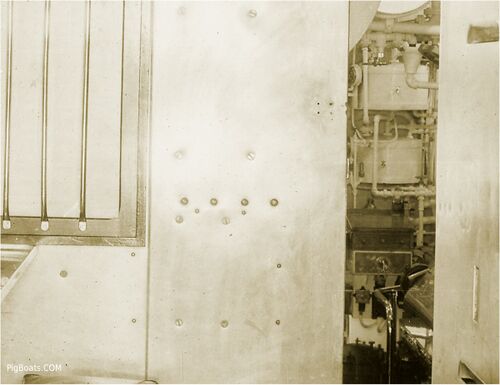
US Navy Photo Contributed by Roger Torgeson
Generator Room
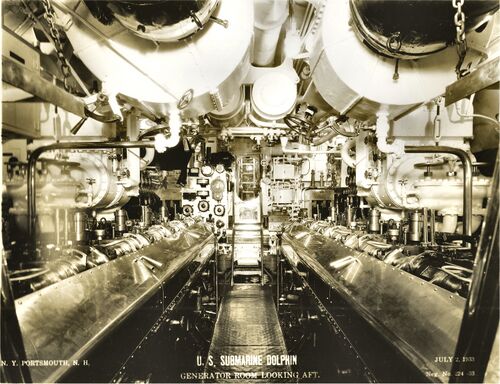
US Navy Photo Contributed by Roger Torgeson
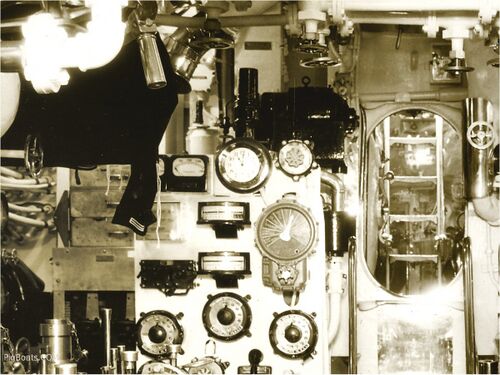
US Navy Photo Contributed by Roger Torgeson
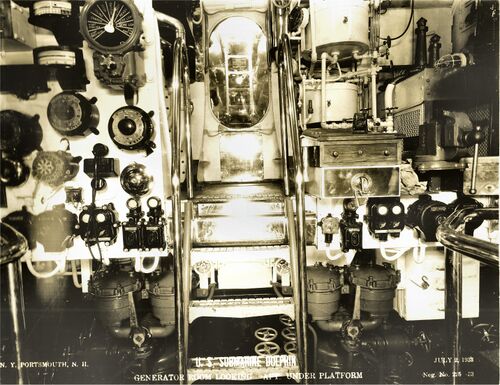
US Navy Photo Contributed by Roger Torgeson
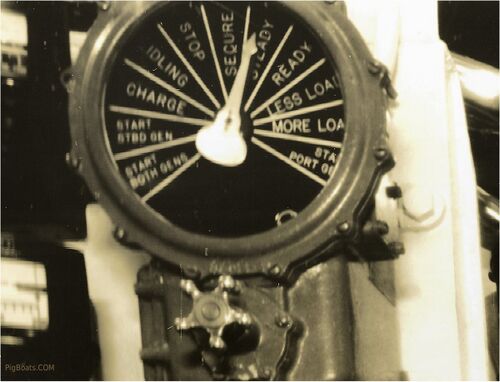
US Navy Photo Contributed by Roger Torgeson
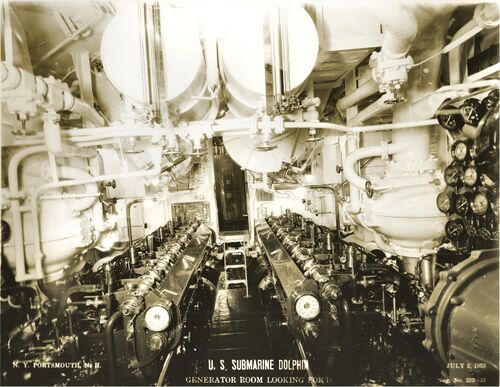
US Navy Photo Contributed by Roger Torgeson
